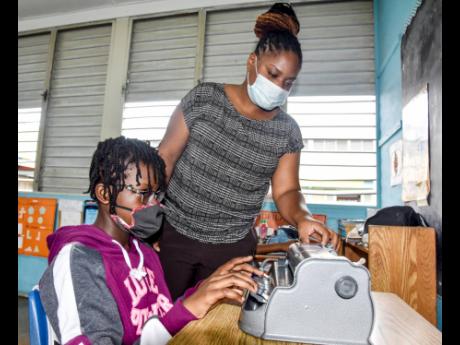Improvement in sight as blind students get Braille machines
Until Tuesday, there were about one or two Braille machines assigned to each class at the Salvation Army School for the Blind, which, at times, had up to 40 students in each session.
The lack of consistently working Braille typewriters at the school, which has 114 students currently enrolled, has been an uphill battle for the educators of the special-needs students.
The problem has cost the school excessively in repair bills annually, said principal Iyeke Erharuyi.
“It’s a good thing we have a reliable person who does the repairs,” Erharuyi said.
The silver lining of the cloud, said the principal, was that the sole Braille repairman operating in the Caribbean is based in Jamaica, saving the school money if the machines had to be shipped to the United States.
Braille literacy is crucial to the education of blind students, giving them an opportunity to learn at the same pace as children who are not handicapped.
“For example, at a particular time, we may have 10 Braille machines [working] and you have up to about 10 classes in need of a Braille machine, so instead of individual machines being assigned to individual students, we now assign Braille machines like two [or] three to a particular class, with up to 10 students sharing one machine,” Erharuyi said in a Gleaner interview on Tuesday.
The needs deficit at the Salvation Army for the Blind was eased on Tuesday with the donation of 20 new Braillers by the United Nations Development Programme (UNDP).
But even with that benevolence, Erharuyi said more equipment was required.
“It’s supposed to be every child having a Braille machine,” Erharuyi said.
Gisellene Laing, grade six teacher, said the school was in dire need of machines to educate three students who are blind and two others with low vision in her class who are preparing for the Primary Exit Profile (PEP) examinations.
“I’m feeling good that we have received new machines because our machines, as soon as we start using them, they start malfunctioning. We have to consistently go to the integrated room to get them repaired, and by the time they’re fixed, I must be honest, they’re back there again,” Laing told The Gleaner.
Demise Antonio, resident representative of the UNDP, said the organisation was fully committed to moving marginalised populations to the centre of development.
“Today’s donation significantly improves the productivity and learning outcomes of students,” Antonio said.
She also called for more public-private partnerships in Jamaica to ensure that institutions that prepare people living with disabilities become suitably equipped to carry out their life mandate.
Additionally, Antonio is lobbying for more support to be given to Jamaica’s Disabilities Act, which came into effect 37 days ago.
“The Jamaica Disabilities Act is an important asset in our shared mission to expand such opportunities for people living with disabilities anchored on your newly guaranteed rights and freedoms,” she said.
More than 200,000 Jamaicans resident here are estimated to be disabled.

